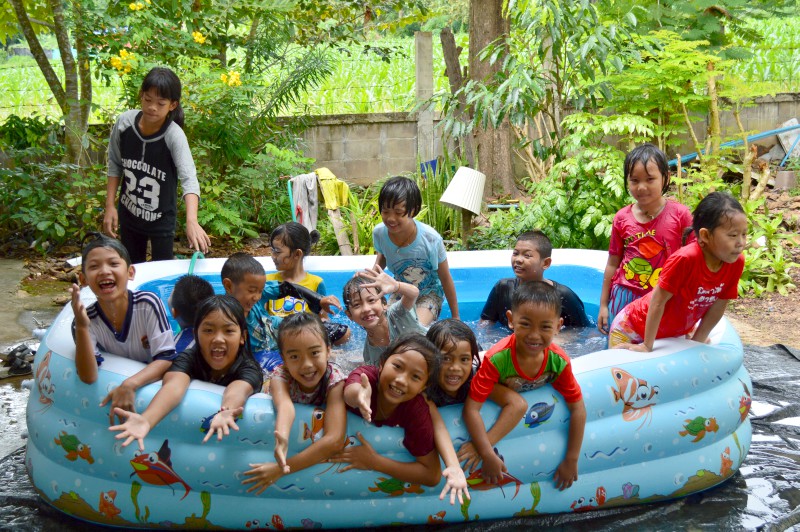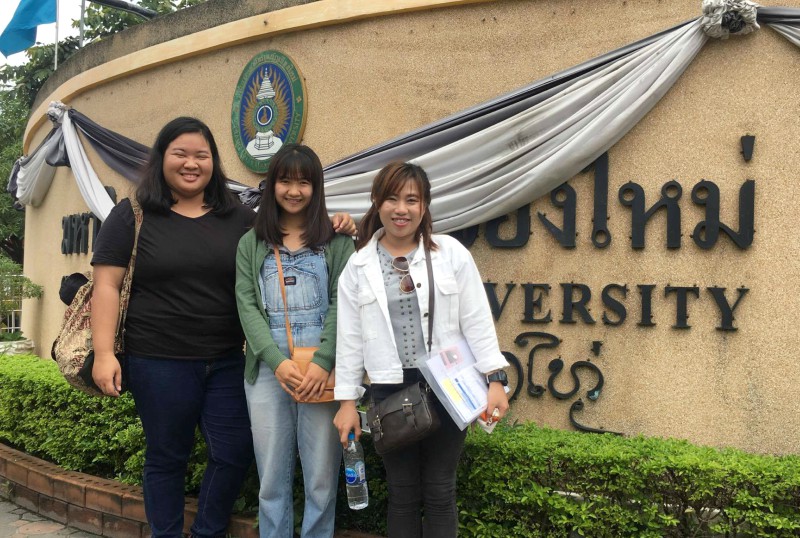“I…want *sniff* to talk *sob* to Kru Ball,” a kindergarten-aged girl whimpers to me as I step out of the classroom at the Pong Phrae Resource center. I don’t recognize her, though on Saturdays new students are not uncommon. I take her to talk to Kru Ball, who successfully calms her down.
It is close to the beginning of the University school year. A scholarship student drops by the Resource Center in the afternoon to withdraw money from her scholarship account. She talks to Ketsara, the Leadership Development Director, for more than an hour, sharing about her stresses and anxieties about starting the school year.
A teenage scholarship student drops in to the Chiang Rai City Center unexpectedly, and comes up to the office. Staff welcome him and ask how he’s doing, is he on school break yet? Does he have anything he wants to talk about? No, he says, he just wanted to come say hi. We all get lunch together and talk about a famous inventor from America, about dreams, about finding the niche in what the world needs, and what we want to do with our lives.
Mentorship is a key pillar in the programming of The Freedom Story. However, it takes many more forms and meets more needs than it may seem.
Mentorship fills a gap in Northern Thai society.
A major challenge facing Northern Thailand is family break down. Poverty, debt, and addiction result in a high number of single parent households, or in children living away from their parents to attend school.
As a result, many of the students at The Freedom Story lack positive role models.
All Freedom Story staff serve as mentors to groups of students. They meet with, share meals with, check in on, and visit their students at their homes. For our scholarship students this is an amazing support- someone to listen and advocate for them when they need advice and a helping hand.
Of The Freedom Story’s 16 staff based in Chiang Rai, 12 of them come from Chiang Rai or Northern Thailand. That is 75% of staff coming from the local communities in which they work. They themselves have experienced many of the same things as our students, and they are able to empathize and offer advice and support. This support is often needed after office hours.
“She calls me at night, often when she is sad and feeling lonely,” explained one Freedom Story staff member whose mentee recently experienced a death in the family. “I talk to her and listen to her and try to encourage her,” she added.
“I’m scared I won’t be able to do my internship well, that I might not be able to speak to the customers,” another student admitted. “Just try it first, you never know how it might go until you try” answered her mentor, giving her a quick encouraging smile.
Staff open up their lives and are available to meet needs as they arise. This helps students feel supported and cared for.
It is not only assigned scholarship students who receive mentoring at The Freedom Story. Staff take a personal interest in all the children who come to the Resource Center, learning their names, meeting their families, connecting them with students their own age to play with. These connections and this level of engagement help increase social networks and social skills among the students. It helps them know they are safe and cared for at the Resource Center, and makes it a place they want to come back to again.
“Young people who are the most disadvantaged or at-risk seem to benefit the most from mentoring,” reports Child Trends, a research center focusing on studying children and families.[1] By pairing our at-risk students with mentors, The Freedom Story is providing the opportunity for students to have an additional positive relationship with a caring adult.
Mentorship creates a chance to share experience.
Imagine if you were only given the opportunity to finish fourth grade. It would be difficult to know how to support your children to go to university, especially in a new, distant location. You might not know how to assuage their fears, or soothe their anxieties, as you have no answers to their questions.
For the vast majority of our students, they are the first generation of their family to attend high school, let alone university. As a result, their parents are not always equipped to relate or support them in those years- they themselves have no way of knowing how to prepare their children for these changes, transitions and challenges.
This is where The Freedom Story staff can step in. With the life experience, training and space to meet with students, they are able to offer advice, guidance and support.
One student shared that “I was scared that when I went to university, I would have to eat alone, that I wouldn’t find friends.” She would meet with staff at the Chiang Rai City Center and share her fears- they were able to share their experience of going to university and that relieved her fears.
Additionally, it has been shown that mentorship can encourage better attendance, a greater chance of going on to higher education, and better attitudes toward school in general.[2] All of these outcomes positively impact our students, encouraging them to stay in school longer and to study hard.
Mentorship Facilitates Students Giving Back
The Freedom Story staff are not the only ones serving as mentors. As we finish our 9th year, many of our scholarship students are older, and able to give back and become mentors in their communities.
Among those who have graduated from university, are teachers, lawyers, NGO staff and other bright lights in their communities, serving as examples of what can be achieved through higher educational attainment.
For those who are still studying, there are ways for them to give back at the Resource Center. Whether by becoming a leader in the Youth Partnership Program, where local students are trained in how to teach about child exploitation, or by helping to run activities for younger students, our older students take the role of mentorship seriously.
In October, six youth leaders, two staff from a partner NGO, ECPAT, and four Freedom Story staff travelled to a local village to run a two-day training on child exploitation. The students lead games, ran activities and facilitated play-based learning about child rights and sexual abuse for over 60 local students. These young leaders had proposed, planned and executed the training themselves. They are great examples of mentorship in action.
Every weekend, older students can be seen helping facilitate games, run activities, teach younger students and hand out snacks. This not only eases the burden for the activities staff, but also is a way for younger students to have someone to look up to, as they see their older friends continuing to pursue education and access the Resource Center, they themselves are encouraged to do the same.
The Impact of Mentorship
The presence of a long-term supportive, stable relationship with a caring adult gives our students more support to succeed. The Center on the Developing Child at Harvard University cites that “the single most common factor for children who develop resilience is at least one stable and committed relationship with a supportive parent, caregiver, or other adult”.[3] Resilience is critical for our students to overcome the obstacles which naturally exist in their lives. Mentorship is way to foster this and assist them on the road to a brighter future with greater opportunities.
[1] https://www.childtrends.org/wp-content/uploads/2002/02/MentoringRB.pdf
[2] https://www.childtrends.org/wp-content/uploads/2002/02/MentoringRB.pdf
[3] Welcoming Practices: Creating Schools that Support Students and Families in Transition








